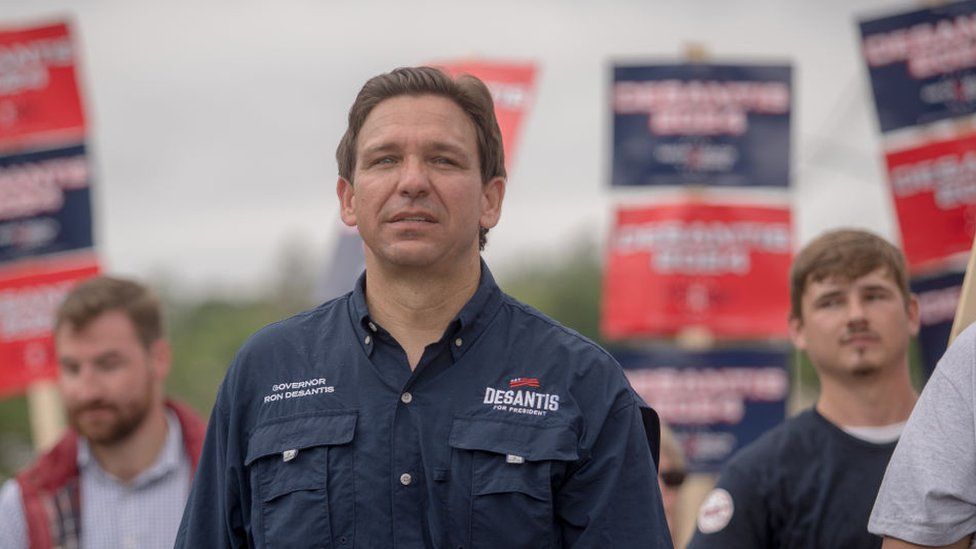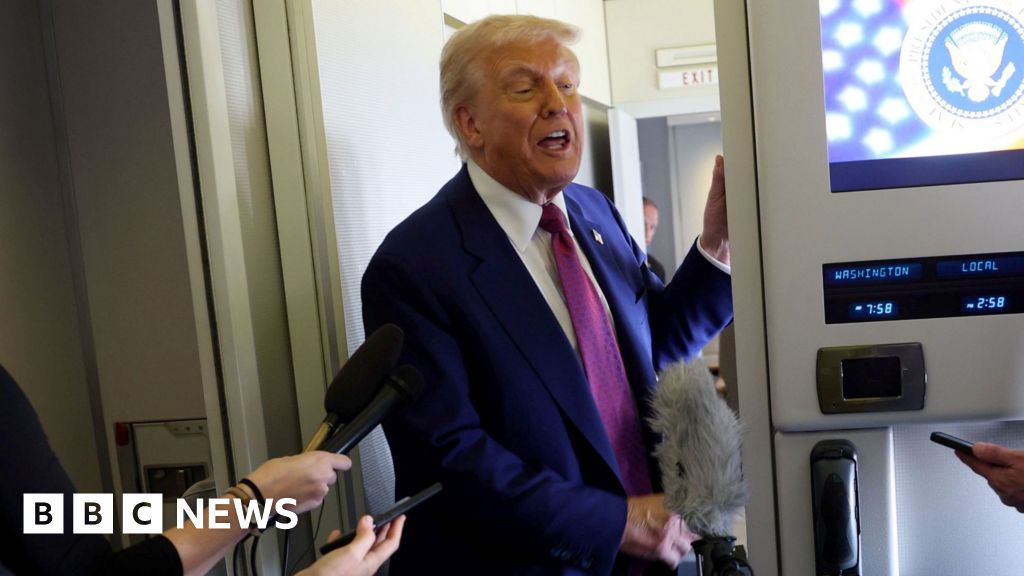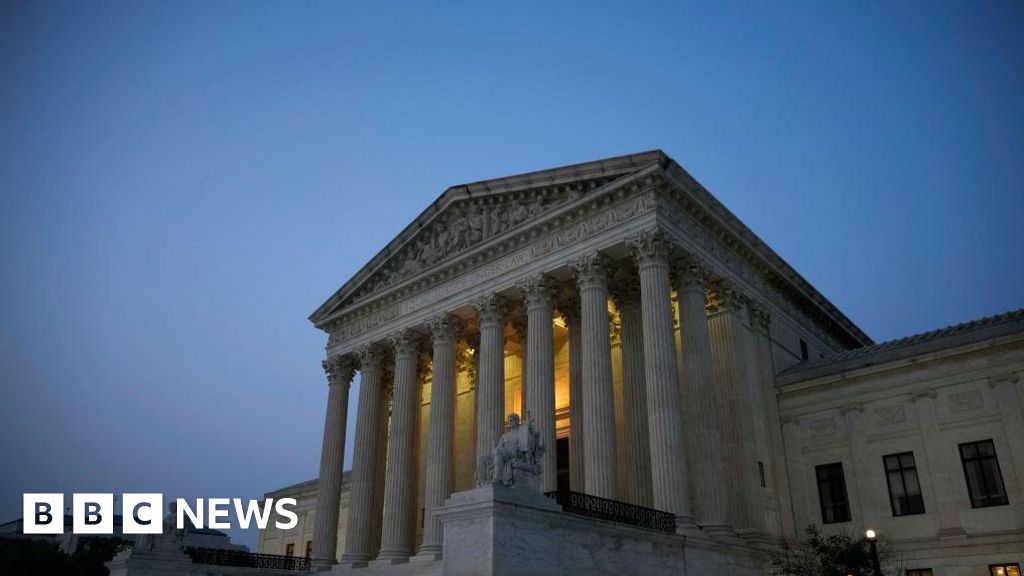ARTICLE AD BOX
 Image source, Getty Images
Image source, Getty Images
Donald Trump's chief rival Ron DeSantis has criticised his threat to skip the debates
By Sam Cabral
BBC News, Washington
Donald Trump has taken a commanding lead in national opinion polls for the 2024 presidential race. His opponents want to make an impression at the debates and change that status quo.
First, each of the 14 candidates must gather enough donors and make enough of a dent in polling to get on the stage.
Several prominent names say they've made the cut, while others are still desperately corralling support.
But with Trump threatening to skip the debates in order to preserve his huge lead, it is unclear how much these forums will influence the race.
When are the debates?
The first debate of the Republican presidential primary will be held on Wednesday 23 August, with a second possibly to follow the next night.
The first one will take place in Milwaukee, Wisconsin, which is also where the party will host its formal nominating convention next year.
Wisconsin is a battleground state that the eventual Republican nominee will probably need to win at the November 2024 general election in order to get to the White House.
At least two more debates are expected in the ensuing months, with the next one expected to be held at the Ronald Reagan Presidential Library in California in September, but no dates have yet been set.
Voting in the Republican primary election begins in Iowa on 15 January 2024, but more debates are likely to be held to help winnow the field. The 2016 election saw the party hold as many as 12 debates.
Why is Trump skipping?
Image source, Getty Images
Image caption,Mr Trump says he sees no need to participate in the debates
Over the past few months, the former president has suggested he won't join the debates.
He has cited polls that show him leading other candidates by "seemingly insurmountable numbers", and has complained that proposed moderators and venues may be "hostile" towards him.
It comes as the Republican Party as a whole has cast doubt over whether it will participate in debates with the eventual Democratic nominee ahead of the general election.
They claim the Commission on Presidential Debates, which has organised such forums since 1987, is "biased and has refused to enact simple and common sense reforms to help ensure fair debates".
Mr Trump, 77, has a history of threatening to skip debates - but does not always follow through.
He boycotted a 2016 debate hosted by Fox News, alleging that moderator Megyn Kelly was biased against him, and hosted a separate event.
He also suggested he might skip his TV duel with Democrat Joe Biden, but did not.
Ahead of the debate this August, he has threatened to hold his own event the same evening.
If Mr Trump does decide he wants to square off with his rivals, however, he will easily qualify for the debate stage.
How do candidates qualify?
In June, the Republican National Committee implemented polling and fundraising standards that candidates need to clear to participate in its debates.
Candidates must receive donations from at least 40,000 contributors, with no fewer than 200 unique donors from a minimum of 20 states or territories.
They must also record more than one percent in at least three polls conducted after 1 July 2023.
These two criteria must be met at least 48 hours before the first debate, and the thresholds are expected to be raised ahead of future debates.
Image source, Getty Images
Image caption,Trump loyalist-turned-critic Chris Christie says he will be on the debate stage
All candidates are also required to commit to supporting the eventual Republican nominee and pledge not to participate in any outside debates.
That's a nod to 2016, when Mr Trump ran as an "outsider" and memorably refused to take such a pledge at the first debate.
So far, Mr Trump and his chief rival Ron DeSantis are on track to qualify. The campaigns for Nikki Haley, Vivek Ramaswamy, Tim Scott and Chris Christie also claim they expect to qualify in time.
Others in the race, however, including former Vice-President Mike Pence and Trump critics Asa Hutchinson and Will Hurd, are yet to make the cut.
Eager to deliver their pitch to a national audience, some long-shot candidates are going to desperate lengths to qualify.
North Dakota Governor Doug Burgum is relying on his personal wealth to offer donors a $20 gift card for every dollar he receives.
The move is "legally suspect", according to election law expert Rick Hasen. Federal law prevents candidates from asking for donations and then reimbursing them for it, he told the BBC.
Other contenders are opting for more innocuous methods. Miami Mayor Francis Suarez is giving away "Dump Biden" bumper stickers, while businessman Perry Johnson is selling $1 T-shirts.
And what about the Democrats?
Only two people are currently challenging President Joe Biden for the Democratic presidential nomination: Marianne Williamson and Robert F Kennedy Jr.
Polls indicate a majority of Democratic voters, including those who support Mr Biden, want to see the nation's oldest ever president participate in debates as he seeks re-election.
That is highly unlikely, given that the Democratic National Committee has expressed its "full and complete support" for Mr Biden and says it will not sponsor any debates.
The Biden campaign has defended that position, by noting that no incumbent president of either party has participated in a primary debate in its modern history.
But critics have cited Mr Biden's unpopularity and concerns over his age to argue the process is undemocratic.

 1 year ago
108
1 year ago
108








 English (US) ·
English (US) ·